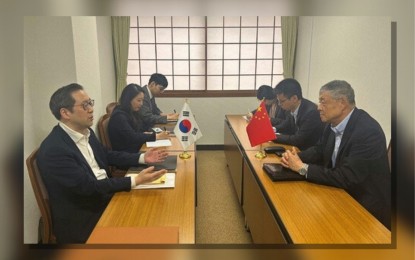
NUCLEAR ENVOYS. Lee Jun-il (left), director general for North Korean nuclear affairs at South Korea's foreign ministry, holds talks with his Chinese counterpart, Liu Xiaoming (right), China's special representative on Korean Peninsula affairs, in Tokyo on the sidelines of the Northeast Asia Cooperation Dialogue (NEACD) on Thursday (May 9, 2024), in this photo provided by Seoul's foreign ministry. The top nuclear envoys of South Korea and China discussed issues related to the Korean Peninsula. (Photo courtesy of Yonhap)
SEOUL – The top nuclear envoys of South Korea and China discussed issues related to the Korean Peninsula on the margins of a multilateral security dialogue in Japan earlier this week, Seoul's foreign ministry said Friday.
The talks between Lee Jun-il, director general for North Korean nuclear affairs, and Liu Xiaoming, China's special representative on Korean Peninsula affairs, took place Thursday in Tokyo on the sidelines of the Northeast Asia Cooperation Dialogue (NEACD), an annual public-private security dialogue forum, the ministry said.
They "exchanged their assessments on the recent situation on the Korean Peninsula and opinions on ways to address" the peninsula issues, the ministry said in a press release, without providing further details.
North Korea's evolving nuclear and weapons developments and its growing military cooperation with Russia were most likely high on the agenda at their talks. China is the North's longtime ally and largest economic benefactor.
The NEACD is a Track 1.5 security forum that brings together government officials and civilian experts from the two Koreas, the United States, China, Japan, and Russia.
It was not immediately known whether the North or Russia attended this week's NEACD. North Korea last attended the meeting in 2016, represented by Choe Son-hui, now serving as the North's foreign minister.
On Friday, Lee held talks with his U.S. counterpart, Jung Pak, who was also in Tokyo to attend the NEACD, and had a broad discussion on North Korea's nuclear and other related issues, Seoul's ministry said.
They "agreed to continue close coordination as they stand firmly by the shared goal toward the complete denuclearization of North Korea," the ministry said.
They also agreed to keep a close watch on the North's possible additional provocations, including the potential launch of another spy satellite, and prepare against any attempts by the North to change the status quo in the Yellow Sea, based on the staunch South Korea-U.S. combined defense posture.
The officials shared an understanding of the need for China to play "a constructive role" in the Korean Peninsula issues and agreed to continue communications with Beijing at all levels.
Aside from the two-way meetings with China and the U.S., Lee also held a trilateral gathering with Pak and their Japanese counterpart, Hiroyuki Namazu, director general for Asian and Oceanian affairs at Japan's foreign ministry, to discuss North Korean threats. (Yonhap)
